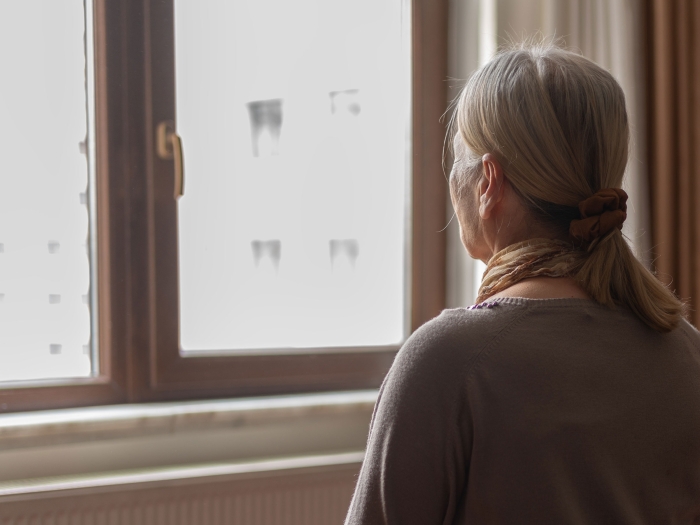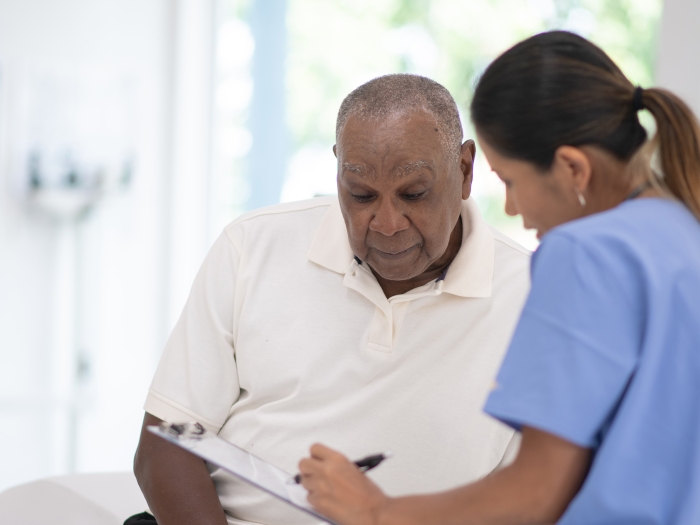Members of Michigan Medicine’s LGBTQ+ Advisory Committee discuss resources for the LGBTQ+ community.
5:35 PM
Author |

June is Pride Month, a time to honor the impact of lesbian, gay, bisexual, transgender and queer/questioning (LGBTQ+) people throughout the United States and beyond.
The Stonewall riots, which occurred at the end of June of 1969, are often characterized as an integral series of events that gave way to the gay liberation movement. They also had a hand in why June was chosen for this celebratory month.
"The LGBTQ+ community continues to face various health care disparities and hardships due to discrimination and other unfair practices," says Pedro Coracides, a project manager in Michigan Medicine's Office of Patient Experience. "That's why it's so important for us to focus on patient and family-centered care for all of our guests, as we constantly strive to make our health system an inclusive space for everyone."
Coracides, Hadrian Kinnear, Nicole Figueroa and Gerald Okler are all members of Michigan Medicine's LGBTQ+ Advisory Committee. They recently spoke to Michigan Health about some of the resources that serve the organization's LGBTQ+ community.
Tell us more about the LGBTQ+ Advisory Committee. What does it aim to do?
Coracides: The advisory committee aims to create enduring and affirming spaces that promote the health and well-being of patients, families, learners, staff, faculty and visitors of all sexual orientations, gender identities and gender expressions at Michigan Medicine.
In pursuit of this aim, the role of the committee is to: 1) Gather key information about the structures, policies, barriers and facilitators regarding promoting LGBTQ+ health at Michigan Medicine; and 2) Provide input and make recommendations to help guide institutional efforts at Michigan Medicine.
The advisory committee is made up of several faculty members, employees, students and patients connected to the health system.
Figueroa: As an employee and an out LGBTQ+ member of this institution for the past 12 years, I really value this group. The Committee is actively advocating for building better systems to provide care to others.
Like Podcasts? Add the Michigan Medicine News Break to your Alexa-enabled device or subscribe for daily updates on iTunes, Google Play and Stitcher.
In my early 20s, I had a negative experience at a doctor's visit and I was treated with bias, which greatly impacted me. To know that I work for an organization that is passionate about improving care for the LGBTQ+ community, while looking at the intersectionality of their patients at the same time, is incredible. Improving patient outcomes is definitely at the forefront of all that we do.
Kinnear: By building on the work of advocates before us, my hope is that this advisory committee can help us to maintain momentum and live our fullest potential as an LGBTQ-affirming health care system.
Okler: We also use this platform as an opportunity to listen to our employees and the broader community, by and large, to assess what we need to improve upon. It's a really great connected space, and we're incredibly proud of it.
With so much of our lives lived separately, Pride is a reminder that we can come together to support our community and each other. This group is a good reminder of that, too.
How does Michigan Medicine assess their performance when it comes to LGBTQ+ health?
Coracides: Michigan Medicine uses the Human Right's Campaign Healthcare Equality Index as a baseline framework for assessing our performance. The report assesses participating health systems on four main criteria: Non-discrimination and staff training, patient services and support, employee benefits and policies, and patient and community engagement.
In 2019, Michigan Medicine scored a 90 out of 100, marking our first year as a top performer.
Are there other notable examples of the work Michigan Medicine has done in this space?
Figueroa: Michigan Medicine was a sponsor of the 2019 Ann Arbor Pride celebrations. Engaging with the community is integral in our work, and it provides our team with an opportunity to further understand the needs of the LGBTQ+ community.
Coracides: The Michigan Medicine Office of Patient Experience recently produced a guide for our visitors to easily access the many single, all-gender restrooms located throughout our hospitals and health centers. This work came as a result of patients and families asking our office for this resource.
In addition, we recently launched our patient story library, which elevates the voices of our patients and families by sharing their health care and patient experience stories. Included in this library are the voices of two wonderful patients in the LGBTQ+ community, Monica Ann and Crow Demortier.
What are some of the LGBTQ+ care programs offered through Michigan Medicine?
Okler: We offer a variety of support groups, including the Transgender and Gender Nonconforming Adult Support Group and a support group for Parents of Gender Nonconforming People. These groups are so important because they offer individuals various platforms to talk about their experiences in a judgement-free environment.
C.S. Mott Children's Hospital also houses the Child and Adolescent Gender Services clinic, which provides care for transgender and gender non-conforming patients, and our Comprehensive Gender Services Program serves adult transgender, gender non-conforming and non-binary patients.
Many members of the LGBTQ+ community are at a higher risk for certain health conditions, including HIV/AIDS. We offer the HIV/AIDS Treatment Program, which provides comprehensive care for our patients by utilizing a multipronged approach to address individual medical and psychological needs.
We also offer the HIV/AIDS Support Group, which is open to HIV+ MSM individuals. The office also provides individual, family or romantic partner therapy to anyone who is HIV+. To learn more about this platform, individuals can call (734) 763-9227.

Explore a variety of health care news & stories by visiting the Health Lab home page for more articles.

Department of Communication at Michigan Medicine
Want top health & research news weekly? Sign up for Health Lab’s newsletters today!





